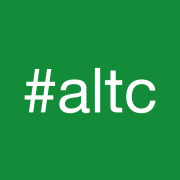 ALT-C is the main annual conference for the Association for Learning Technology. It is a great environment in which to see what others are doing, and to think about some of the big ideas that affect education.
ALT-C is the main annual conference for the Association for Learning Technology. It is a great environment in which to see what others are doing, and to think about some of the big ideas that affect education.
In this post I’ll share some of the messages from the conference that I personally would like to consider further.
Keynote: Steve Wheeler
Key Message – Students could help us think in different ways.
Steve Wheeler from Plymouth University explored how learning is changing, and how we may need the help of students to help us think in new ways.
It can be difficult for us to notice the opportunities that new technology offers us; things change fast and we have little time. I was reminded that in around 2008 there was a short time when students often complained that they couldn’t get on campus computers to do work, because almost every computer was logged into Facebook. It was the consequence of a time just after the growth and adoption of social media, but just before everyone had smartphones that could be used to access the social media tools. These sort of odd things happen, and almost before we can react properly they’ve changed again. If these situations (both opportunities and challenges) are difficult to predict in the short term, then in the long term it is impossible to think what might change and how the collection of those changes working together might affect our context.
We could learn from each year’s intake of students about how technology could be used. Steve used the example of interactive whiteboards where early users just used them like blackboards, but someone without the experience of using blackboards who was given time to explore, might discover the possibilities.
In the past the learning technologies we had such as videos, and TVs, were primarily transmission tools, but now networked technologies can help move us towards student centered learning.
Teachers are often nervous about using technology, because there can be aspects of technology use that they think the students understand better than them. Even Steve’s students reported feeling like this when they went into school to do teaching practice and became the teacher, so the nervousness doesn’t seem to be related to age and experience with the technology. Personally I feel the same in induction sessions with the students when you advise a student to solve an issue one way, and other students come with other (sometimes better) solutions. I feel like I’m losing the position of ‘expert’, but as Steve is saying, perhaps we have to accept that in a complex changing environment there is no alternative.
On the topic of where the technological expertise lies, Steve pointed out that the ‘Visitors’ and ‘Residents’ theory is better than the much criticised ‘Digital Natives and Digital Immigrants’ theory if we are going to understand the way staff and students approach technological tools and spaces.
Keynote: Phillip Long
Key Messages – Cognitive Science can tell us a lot about learning. Performance and learning are not the same.
Phillip Long from the University of Texas at Austin spoke about the importance of using what we know from cognitive science when designing learning activities and environments.
First he talked about Soderstrom and Bjork’s work on the difference between learning and performance, where “Learning reflects the relatively permanent changes in behaviour or knowledge that support long-term retention & transfer” and performance is the “temporary fluctuations in behaviour or knowledge that can be observed and measured during or immediately after the first acquisition process”.
He discussed how there are different techniques for practicing in learning (e.g. distributed practice), and how some will work better for short term performance and some for long term learning. This can cause problems when working with students as they can really enjoy the results of short term performance gains and find aiming for these motivating. Long term learning methods with initially poor results can cause them to react badly.
He talked about EdX’s use of Cerego (see Jessie Brown’s overview) which is software that learns your personalised memory decay curve and aims to use this to optimise learning and methods of practice. Also if we want to encourage students to do important, but potentially tedious learning activities there is evidence that introducing transcendent purpose can help students, especially those with poor grades to start with.
He finished with the question “How can we bring good learning science into elegant learning environments that fit your institutional culture?”
Keynote: Laura Czeriewicz
Key Message – Online learning can play a role in reducing inequality.
Laura Czerniewicz spoke on the effects of online learning on inequality. She notes that we saw $1.87 billion (£1.22 billion) in ed tech funding in 2014, which means the effects cannot be large, including the effects on the developing world. She referred to Therborn’s 2013 book that looks at types of inequality to consider.
To face challenges in this area, she mentioned that we need to be aware of:
- how online learning benefits some groups more than others
- how learners need help so that they are prepared to learn in the online environment
- how access to electricity and the internet affects any strategy
- how mobile may be the answer if the price of data can be reduced
- how verification of learning rather than learning alone is required for people to get jobs
- how colonial attitudes need to be avoided and pluralistic epistemologies considered
Other Things of Interest
Key Message – Technology is not neutral.
The work P.A. Danaher was presenting was based on Affordance Theory (Gibson, 1979) via Actor-Network Theory (Wright & Parchoma, 2011). He mentioned how these theories say that technology is not neutral but shapes and is shaped by its users and occupants, and how effective research needs to respect that.
Key Message – Learning Technologists should be agents of change.
Peter Bryant from London School of Economics talked about the ‘Middle Out’ approach to institutional change. This was a concept taken from politics about the importance of creating growth through the middle classes, but in his focus on institutional change he says that there is a problem when Learning Technologists end up just maintaining the status quo by just supporting existing practices and not innovating new ones.
Peter argued that Learning Technologists should see themselves as agents and leaders of change at a strategic level and that we should aim for “a role where the learning technologist argues, lobbies, supports and resources change and where they work to break down functional barriers and silos between academic and professional services, in order to seek change through the development and celebration of a collective identity”.
Key Message – Technology affects power dynamics between teachers and learners.
Jonathon Worth spoke about his experiences as a photographer, how he learned to take advantage of the open nature of the web, and the resulting open course he ran. He discussed ethics around loss of privacy, changes to power within a class, cultural and technological barriers that might emerge, and how technology might affect trust. The idea that students should be asked to give informed consent around their use of ‘the digital’ is a challenge.
Key Message – Virtual field trips are possible, but require a lot of initial development.
Work from the School of Earth and Environment, University of Leeds was presented, where they had created a field trip environment (works best in Firefox) using the Unity game engine. This allowed field trip activities to be undertaken without the travelling, and allowed disabled students to participate more fully in them. The level of detail was only really suitable for undergraduate study, and they are looking at the possibilities of developing it in more detail for post-graduate learners. Adding hand drawn field sketches to the simulation alone took 80 hours work, which indicates the time taken up by the project.
Peter Beaumont
Learning Technology Development Officer

